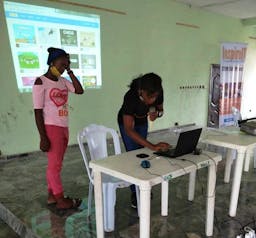Bridging the gap in STEM: Challenging the issues facing young girls in Secondary Schools in Africa
May 28, 2019
Story

Majority of the people in Africa are well aware of technological innovations and how these innovations have impacted on their lives, both positively and negatively. Aside the cultural challenges that many young girls face in Africa, there are still many challenges that young girls in secondary schools in Africa who are interested in STEM (Science, Technology, Engineering and Mathematics) face. Some of these challenges include: lack of computers, dilapidated science labs, lack of access to the internet,etc.
I visited one of the Girls Secondary School in South South Zone of Nigeria. I had a discussion one on one with the Principal of the Girls Secondary School about InspireIT (InspireIT is a free mentoring program for young girls and women studying or interested in Science, Technology, Engineering and Mathematics), how I believe that InspireIT could help the young girls in her school especially the ones in senior class 3 (who hopefully will proceed to the University). Most importantly, I reminded her that it was FREE! She interrupted me half way with the following points:
1. If I was aware that most of the young girls in her school were housemaids (a housemaid is girl or woman employed to do housework, especially one who is resident in the household) and as such have little or no time for a mentoring program.
2. Majority of the young girls in her school do not have access to mobile phones and the internet
3. Lack of computers
4. Many school activities (It will not be ‘easy’ to fit me in to discuss with the students)
After listening to the points she made, I made some suggestions:
1. If she could spare at least 10 mins (even if it is during their break time) to enable me speak to the young girls in senior class 3 (since they were my target audience) about the free mentoring program.
2. Speak to the girls during assembly in the morning about InspireIT
3. Organize a forum in the school (in collaboration with their science teachers)where we can speak to the young girls about STEM and the challenges they face since majority of them are housemaids, have no access to mobile phones, computers and the internet.
At the end of our discussion, the principal gave me her phone number and I gave her flyers containing information about InspireIT including letter of consent for the young girls. I promised to give her time to think about it and discuss with her staff.
Challenges
In most countries in Africa such as Nigeria, access to the internet/mobile broadband is a still a big issue. Majority of the students in Secondary Schools cannot use computers but can use their mobile phones. Even when they have mobile phones, most of these students are more interested in using it for social media such as Facebook and chatting to their friends (which is not a bad thing) than for self improvement. Some of these challenges such as lack of computers and access to internet also affect InspireIT because most of the mentees have to pay lots of money either at a cybercafé (including their transport to the cybercafé) or to recharge their mobile phones to be able to access the internet (check emails or use social media) and as such communicating with their mentor is ‘difficult’.
Many secondary school science labs especially in rural parts of Nigeria are not equipped and as such many students only read about science ‘practicals’ in textbooks. Some of the classrooms where these science ‘practicals’ take place are dilapidated.
The cost of mobile broadband in many countries in Africa is still on the high side. According to Dashboard Marketing Intelligence’s Pinpoint, internet usage is highest on mobile by the younger part of Nigeria’s population. Within the 16-17 age group (the group where most girls in senior secondary schools in Nigeria fall) 46% accessed the internet via their mobile phones while the 26-35 year olds are the largest users because most of them are more likely to afford smart phones and data usage. Internet café or Cybercafé appears to be an option for many younger users.
The Big Question
How can more young girls and women in Africa be recruited into the sciences, engineering, mathematics, and technology fields when majority have no access to computers/internet and many still don’t know how to use it?
Proposed Solutions
1. Provide more computers for secondary schools
2. Set up programs for young girls in Africa especially those in secondary schools to promote careers in STEM (InspireIT needs help and collaborators in this area)
3. Teach young girls about the benefits of Mobile Technology
4. Collaborate with science teachers in secondary schools and organize forums/quiz competitions for young girls interested in pursuing a career in STEM
5. Train more teachers in Computer Science
6. Organize workshops/seminars/trainings for science teachers and young girls in secondary schools to update their skills
7. Set up a medium where experts in STEM can speak to young girls in secondary schools from time to time (InspireIT needs help and collaborators in this area)
On a general note
Organising STEM forums, providing computers and access to the internet will make a huge difference in the lives of many young girls in Africa especially those interested in pursuing a career in STEM.




